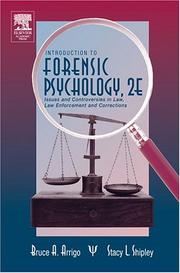| Listing 1 - 10 of 73 | << page >> |
Sort by
|
Book
ISBN: 1784505056 9781784505059 1785922300 9781785922305 9781785922305 Year: 2018 Publisher: Philadelphia : Jessica Kingsley Publishers,
Abstract | Keywords | Export | Availability | Bookmark
 Loading...
Loading...Choose an application
- Reference Manager
- EndNote
- RefWorks (Direct export to RefWorks)
Book
ISBN: 1462538339 1462538312 Year: 2019 Publisher: New York ; London : The Guilford Press,
Abstract | Keywords | Export | Availability | Bookmark
 Loading...
Loading...Choose an application
- Reference Manager
- EndNote
- RefWorks (Direct export to RefWorks)
Psychological research can provide constructive explanations of key problems in the criminal justice system--and can help generate solutions. This state-of-the-art text dissects the psychological processes associated with fundamental legal questions: Is a suspect lying? Will an incarcerated individual be dangerous in the future? Is an eyewitness accurate? How can false memories be implanted? How do juries, experts, forensic examiners, and judges make decisions, and how can racial and other forms of bias be minimized? Chapters offer up-to-date reviews of relevant theory, experimental methods, and empirical findings. Specific recommendations are made for improving the quality of evidence and preserving the integrity of investigative and legal proceedings.
Book
ISBN: 8494682903 Year: 2017 Publisher: [Barcelona] : Bosch Editor,
Abstract | Keywords | Export | Availability | Bookmark
 Loading...
Loading...Choose an application
- Reference Manager
- EndNote
- RefWorks (Direct export to RefWorks)
Book
ISBN: 0190230142 1282402889 9786612402883 0199706883 9780199706884 9780195372687 0195372689 Year: 2010 Publisher: New York : Oxford University Press,
Abstract | Keywords | Export | Availability | Bookmark
 Loading...
Loading...Choose an application
- Reference Manager
- EndNote
- RefWorks (Direct export to RefWorks)
Forensic mental health assessment (FMHA) has grown into a specialization informed by research and professional guidelines. This series presents up-to-date information on the most important and frequently conducted forms of FMHA. The 19 topical volumes address best approaches to practice for particular types of evaluation in the criminal, civil, and juvenile/family areas. Each volume contains a thorough discussion of the relevant legal and psychological concepts, followed by a step-by-step description of the assessment process from preparing for the evaluation to writing the report and testifyi
Book
ISBN: 9786612939181 1282939181 0191576417 9780191576416 9780191613951 0191613959 9780191777332 0191777331 9780199550203 0199550204 Year: 2010 Publisher: Oxford : Oxford University Press,
Abstract | Keywords | Export | Availability | Bookmark
 Loading...
Loading...Choose an application
- Reference Manager
- EndNote
- RefWorks (Direct export to RefWorks)
Lie detection, offender profiling, insanity in the law, the minds of serial killers, & many other topics that fill news & fiction are all aspects of the rapidly developing area of forensic psychology. David Canter shows how these topics bridge the gaps between academics & practitioners, behavioural sciences, & the law.
Book
ISBN: 9781479846658 1479846651 9781479819850 1479885843 9781479885848 1479819859 9781479819850 Year: 2017 Publisher: New York, NY : New York University Press,
Abstract | Keywords | Export | Availability | Bookmark
 Loading...
Loading...Choose an application
- Reference Manager
- EndNote
- RefWorks (Direct export to RefWorks)
Reveals how gender intersects with race, class, and sexual orientation in ways that impact the legal status and well-being of women and girls in the justice system. Women and girls’ contact with the justice system is often influenced by gender-related assumptions and stereotypes. The justice practices of the past 40 years have been largely based on conceptual principles and assumptions—including personal theories about gender—more than scientific evidence about what works to address the specific needs of women and girls in the justice system. Because of this, women and girls have limited access to equitable justice and are increasingly caught up in outdated and harmful practices, including the net of the criminal justice system. Gender, Psychology, and Justice uses psychological research to examine the experiences of women and girls involved in the justice system. Their experiences, from initial contact with justice and court officials, demonstrate how gender intersects with race, class, and sexual orientation to impact legal status and well-being. The volume also explains the role psychology can play in shaping legal policy, ranging from the areas of corrections to family court and drug court. Gender, Psychology, and Justice provides a critical analysis of girls’ and women’s experiences in the justice system. It reveals the practical implications of training and interventions grounded in psychological research, and suggests new principles for working with women and girls in legal settings.

ISBN: 9780080468532 0080468535 9780120643516 0120643510 1280754273 9786610754274 Year: 2005 Publisher: Amsterdam ; Boston : Elsevier,
Abstract | Keywords | Export | Availability | Bookmark
 Loading...
Loading...Choose an application
- Reference Manager
- EndNote
- RefWorks (Direct export to RefWorks)
Introduction to Forensic Psychology, Second Edition is an original approach to understanding how psychologists impact the research, practice, and policy of crime, law, and justice. Divided into four sections on criminal forensics, civil forensics, policing and law enforcement, and corrections and prison practices, the text examines police, court, and correctional aspects of forensic psychology. Each of the twelve chapters are organized around relevant case illustrations, include comprehensive literature reviews, and discuss policy implications and avenues of future research. Each chapte
Periodical
Year: 2010 Publisher: [Moscow] : Moskovskiĭ gorodskoĭ psikhologo-pedagogicheskiĭ universitet,
Abstract | Keywords | Export | Availability | Bookmark
 Loading...
Loading...Choose an application
- Reference Manager
- EndNote
- RefWorks (Direct export to RefWorks)
Book
ISBN: 9814998338 9789814998338 9789814998345 Year: 2021 Publisher: Singapore : Bentham Science Publishers,
Abstract | Keywords | Export | Availability | Bookmark
 Loading...
Loading...Choose an application
- Reference Manager
- EndNote
- RefWorks (Direct export to RefWorks)
In recent times, the phenomenon of lone wolf terrorism has been observed with the social assumption that a radicalized individual is only guided by personal, social, and ethnic reasons to commit an extremist act. Nevertheless, there is still much to understand about this phenomenon and improve the methods of investigation or psychiatric interventions. This handbook attempts to cover gaps in understanding the psychiatric aspects of radicalization and the phenomenon of lone-wolf terrorism. Edited by expert clinical psychologists, the contributors have taken both a qualitative and theoretical route to analyze the phenomenon, prompted by their clinical experience with mental health professionals, being in contact with radicalized people living in local towns and prisons.Key Features- Addresses the topic of lone wolf terrorism from multiple angles including psychological aspects, social aspects, philosophical aspects and prevention- Provides insights into forensic psychiatric methods used to study terrorism- Includes contributions from several mental health experts- Explains information in a concise, easy to comprehend manner- Includes references for further researchPsychological Assessment and Interventions for Individuals Linked to Radicalization and Lone Wolf Terrorism serves as a practical handbook for psychologists, psychiatrists, criminologists, social workers, allied professionals (such as law enforcement officers) and students (in criminology, social science or psychology programs for example) who want to learn about the causes and prevention of terrorism, with a focus on radicalization processes and lone wolf agents.
Terrorists --- Psychology. --- Forensic Psychology --- Psychology

ISBN: 1135453195 1583912231 9786610048441 1135453209 1280048441 0203420667 9780203420669 9781135453206 9781135453152 1135453152 9781135453190 9781583912232 9781583912249 158391224X 6610048444 9781280048449 158391224X Year: 2003 Publisher: Hove ; New York : Brunner-Routledge,
Abstract | Keywords | Export | Availability | Bookmark
 Loading...
Loading...Choose an application
- Reference Manager
- EndNote
- RefWorks (Direct export to RefWorks)
Why do people commit violent offences? Does rehabilitation really work?Personal Construct Perspectives on Forensic Psychology provides a new approach to the three main areas of application of forensic psychology; rehabilitation of offenders, work with police, and research and consultation on legal issues and processes. Challenging the mainstream approach to viewing offenders, this book emphasizes responsibility for life choices, and eschews the biomedical view of people.Practising psychologists share their perspectives and illustrate their discussion with case studies and pers
| Listing 1 - 10 of 73 | << page >> |
Sort by
|

 Search
Search Feedback
Feedback About UniCat
About UniCat  Help
Help News
News